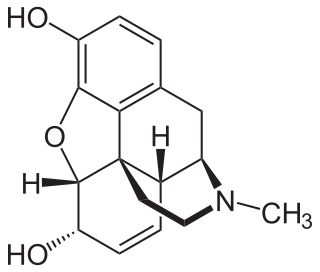Drug rehabilitation is the process of medical or psychotherapeutic treatment for dependency on psychoactive substances such as alcohol, prescription drugs, and street drugs such as cannabis, cocaine, heroin or amphetamines. The general intent is to enable the patient to confront substance dependence, if present, and stop substance misuse to avoid the psychological, legal, financial, social, and physical consequences that can be caused.

Opioid use disorder (OUD) is a substance use disorder characterized by cravings for opioids, continued use despite physical and/or psychological deterioration, increased tolerance with use, and withdrawal symptoms after discontinuing opioids. Opioid withdrawal symptoms include nausea, muscle aches, diarrhea, trouble sleeping, agitation, and a low mood. Addiction and dependence are important components of OUD.

Naltrexone, sold under the brand names Revia and Vivitrol among others, is a medication primarily used to manage alcohol use or opioid use disorder by reducing cravings and feelings of euphoria associated with substance use disorder. It has also been found effective in the treatment of other addictions and may be used for them off-label. An opioid-dependent person should not receive naltrexone before detoxification. It is taken by mouth or by injection into a muscle. Effects begin within 30 minutes,though a decreased desire for opioids may take a few weeks to occur.
An opioid antagonist, or opioid receptor antagonist, is a receptor antagonist that acts on one or more of the opioid receptors.

Nalmefene is a medication that belongs to the class of opioid antagonists. It is used in the treatment of opioid overdose and alcohol dependence. Nalmefene can be taken orally, administered by injection, or delivered through nasal administration.

George F. Koob is a Professor and former Chair of the Committee on the Neurobiology of Addictive Disorders at the Scripps Research Institute and Adjunct Professor of Psychology, Psychiatry, and Skaggs School of Pharmacy and Pharmaceutical Sciences at the University of California, San Diego. In 2014 he became the director of the National Institute on Alcohol Abuse and Alcoholism.

Nora Volkow is a Mexican-American psychiatrist. She is currently the director of the National Institute on Drug Abuse (NIDA), which is part of the National Institutes of Health (NIH).
David C. Lewis was Professor Emeritus of Medicine and Community Health and the Donald G. Millar Distinguished Professor of Alcohol and Addiction Studies at Brown University.
Drug detoxification is variously the intervention in a case of physical dependence to a drug; the process and experience of a withdrawal syndrome; and any of various treatments for acute drug overdose.
Bankole A. Johnson, DSc, MD, MPhil, FRCPsych is a licensed physician and board-certified psychiatrist throughout Europe and the United States who served as Alumni Professor and Chairman of the Department of Psychiatry and Neurobehavioral Sciences at the University of Virginia. Johnson's primary area of research expertise is the psychopharmacology of medications for treating addictions, and he is well known in the field for his discovery that topiramate, a gamma-aminobutyric acid (GABA) facilitator and glutamate antagonist, is an effective treatment for alcoholism. Professor Johnson also received national media attention for his appearance in the Home Box Office (HBO) original documentary feature, "Addiction", which won the prestigious Governors Award, a special Emmy Award, from the Academy of Television Arts and Sciences. Professor Johnson recently accepted an appointment to join the University of Maryland as the Chairman of Psychiatry and to lead a Brain Science Research Consortium in the neurosciences.
Herbert David Kleber was an American psychiatrist and substance abuse researcher. His career, centered on the evidence-based treatment of addiction, focused on scientific approaches in place of punishment and moralisms. His career focused on pathology of addiction to help patients reduce the severe discomforts of withdrawal, avoid relapse and stay in recovery.

Addiction is generally a neuropsychological disorder defining pervasive and intense urge to engage in maladaptive behaviors providing immediate sensory rewards, despite their harmful consequences. Dependence is generally an addiction that can involve withdrawal issues. Addictive disorder is a category of mental disorders defining important intensities of addictions or dependences, which induce functional disabilities. There are no agreed definitions on these terms – see section on 'definitions'.

Mark S. Gold is an American physician, professor, author, and researcher on the effects of opioids, cocaine, tobacco, and other drugs as well as food on the brain and behavior. He is married to Janice Finn Gold.
The American Academy for Addiction Psychiatry (AAAP) is a professional organization and an accredited Continuing Medical Education (CME) provider, based in East Providence, Rhode Island, USA. Its members are specialists in addiction psychiatry and other health care professionals who treat patients with addictions. AAAP provides medical education programs in the field of addiction psychiatry.
Subjective response to alcohol (SR) refers to an individual's unique experience of the pharmacological effects of alcohol and is a putative risk factor for the development of alcoholism. Subjective effects include both stimulating experiences typically occurring during the beginning of a drinking episode as breath alcohol content (BAC) rises and sedative effects, which are more prevalent later in a drinking episode as BAC wanes. The combined influence of hedonic and aversive subjective experiences over the course of a drinking session are strong predictors of alcohol consumption and drinking consequences. There is also mounting evidence for consideration of SR as an endophenotype with some studies suggesting that it accounts for a significant proportion of genetic risk for the development of alcohol use disorder.
David R. Gastfriend is an American psychiatrist, internationally recognized addiction treatment researcher, the former Chief Executive Officer of the Treatment Research Institute (TRI), and current Chief Medical Officer of DynamiCare Health.
Narcology, from Russian нарко- + -логия is a subspecialty of psychiatry dealing with the prevention, treatment, diagnosis, social care and recovery of drug-dependent persons. The study and science of phenomena of "narcomania", "toxicomania", chronic alcoholism, and its ætiology, pathogenesis, and clinical aspects. The term for a practitioner of narcology is narcologist. In the United States, the comparable terms are "addiction medicine" and "addictionist".
John F. Kelly is an American-based researcher and professor of addiction medicine at Harvard Medical School. He is the Founder and Director of the Massachusetts General Hospital Recovery Research Institute, Associate Director of the MGH Center for Addiction Medicine, and Program Director of the MGH Addiction Recovery Management Service.
John David Sinclair was an American scientist and researcher best known for discovering the Alcohol Deprivation Effect (ADE) and targeted pharmacological extinction, otherwise known as the Sinclair Method, as a medication treatment for Alcohol Use Disorder (AUD).

Joseph R. Volpicelli, M.D., Ph.D. is an American Psychiatrist, research scientist, medical educator, and expert in the treatment of addictive disorders. He is board certified in neurology, psychiatry and addiction psychiatry. He is currently the Medical Director at Volpicelli Center, an out-patient addiction treatment facility in Plymouth Meeting, Pennsylvania, as well as the Executive Director at Institute of Addiction Medicine, a non-profit research entity also in Plymouth Meeting, Pennsylvania.








